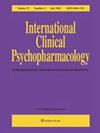Metabolic syndrome and its relation to antipsychotic polypharmacy in schizophrenia, schizoaffective and bipolar disorders.
IF 2.1
3区 医学
Q3 PHARMACOLOGY & PHARMACY
引用次数: 0
Abstract
The risk of metabolic syndrome (MetS) has been attributed to antipsychotic use in psychiatric patients. To date, there is limited data on the relationship between antipsychotic polypharmacy and MetS in patients with schizophrenia, schizoaffective disorder and bipolar disorder. Therefore, we aimed to investigate the rate of MetS in patients with these disorders receiving antipsychotic monotherapy and polypharmacy. We conducted a cross-sectional study on patients seen between January 2017 and December 2020, collecting data on the class, type, route of administration and number of antipsychotics received. We used the American Association of Clinical Endocrinology criteria to diagnose MetS. We included 833 subjects of whom 573 (68.8%) received antipsychotic monotherapy and 260 (31.2%) received polypharmacy. Overall, 28.6% (N = 238) had MetS with no statistical difference between the two groups. Diastolic blood pressure and receiving olanzapine were significant predictors for developing MetS. In conclusion, our study found no significant difference in the rate of MetS between antipsychotic monotherapy and polypharmacy. A number of variables were significant predictors for MetS. Our findings were consistent with other studies and warrant the need for careful choice of antipsychotics and regular screening and management of abnormal metabolic parameters.精神分裂症、情感分裂症和双相情感障碍患者的代谢综合征及其与抗精神病药物多药治疗的关系。
精神病患者使用抗精神病药物有可能导致代谢综合征(MetS)。迄今为止,有关精神分裂症、情感分裂症和双相情感障碍患者服用抗精神病药物与代谢综合征之间关系的数据还很有限。因此,我们旨在调查接受抗精神病药物单药治疗和多药治疗的这些障碍患者的 MetS 发生率。我们对2017年1月至2020年12月期间就诊的患者进行了横断面研究,收集了他们接受的抗精神病药物的类别、类型、给药途径和数量等数据。我们采用美国临床内分泌学会的标准来诊断 MetS。我们纳入了 833 名受试者,其中 573 人(68.8%)接受了抗精神病药物单药治疗,260 人(31.2%)接受了多药治疗。总体而言,28.6%(N = 238)的受试者患有 MetS,两组之间没有统计学差异。舒张压和接受奥氮平治疗是发生 MetS 的重要预测因素。总之,我们的研究发现,单一抗精神病药物治疗组和多种药物治疗组的 MetS 发生率没有明显差异。一些变量是 MetS 的重要预测因素。我们的研究结果与其他研究结果一致,因此有必要谨慎选择抗精神病药物,并定期筛查和管理异常代谢参数。
本文章由计算机程序翻译,如有差异,请以英文原文为准。
求助全文
约1分钟内获得全文
求助全文
来源期刊
CiteScore
4.40
自引率
23.10%
发文量
97
审稿时长
>12 weeks
期刊介绍:
International Clinical Psychopharmacology provides an essential link between research and clinical practice throughout psychopharmacology. It reports on studies in human subjects, both healthy volunteers and patients, which relate the effects of drugs on psychological processes.
A major objective of the journal is to publish fully refereed papers which throw light on the ways in which the study of psychotropic drugs can increase our understanding of psychopharmacology. To this end the journal publishes results of early Phase I and II studies, as well as those of controlled clinical trials of psychotropic drugs in Phase II and IV. Other topics covered include the epidemiology of psychotropic drug prescribing and drug taking, the sociology of psychotropic drugs including compliance, and research into the safety and adverse effects of these compounds.

 求助内容:
求助内容: 应助结果提醒方式:
应助结果提醒方式:


